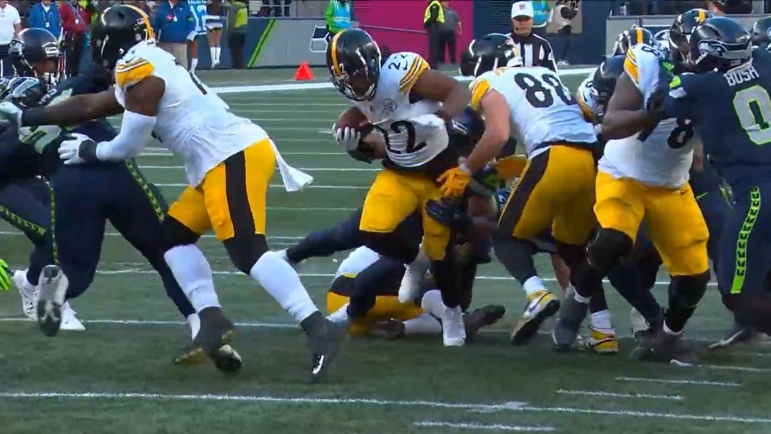The Pittsburgh Steelers made the somewhat surprising decision to decline Najee Harris’ fifth-year option last Thursday, just minutes before the deadline. He hasn’t been the most efficient or productive to live up to his first-round status, but he has three-straight seasons over 1,000 rushing yards and hasn’t missed a game in his career. RBs aren’t drafted very often in the first round anymore, but part of the reason you would do so is to have the fifth-year option to get one extra year of team control before negotiating the increasingly tricky second contract for a running back.
Former Steelers RB great Jerome Bettis weighed in on the Harris decision Thursday morning.
“I was surprised, but here’s why I’m not surprised,” Bettis said in an appearance on the Joe Starkey Show on 93.7 The Fan. “I’m not surprised because there’s, I believe, a conscious effort the NFL has taken on running backs…to keep the numbers for running backs under wraps so that they can have the money to go give to quarterbacks, and give to wide receivers, and give to tight ends.”
The contract value is one of the few reasons why the Steelers likely declined Harris’ option. It was only going to be $6.79 million fully guaranteed for 2025, which isn’t terribly expensive, but they are going to have some sizable negotiations next offseason that will require every bit of cap space to navigate – Russell Wilson, Justin Fields, T.J. Watt, and George Pickens to name a few.
They also reportedly want to see how the running backs respond to the new offensive system under OC Arthur Smith. He tends to deploy more wide-zone concepts in the running game, and that might not be best suited for Harris’ skill set. There is also the emergence of Jaylen Warren, who has been much more efficient on a per-touch basis than Harris.
Bettis contends that some of the lack of production on Harris’ part isn’t necessarily his fault.
“The Steelers didn’t put the offensive line out there that was gonna give him success,” Bettis said. “I think last year was probably the first year where you had an offensive line that really could be good at run blocking…at running back you just look at the numbers – oh well he didn’t produce – well, there was some years that I didn’t really produce.
“So was my numbers tied to my offensive line? Absolutely, they were. I had a great offensive line. And so that’s part of it, and when you look at his career, you say, ‘Did he have a great offensive line at any point?’ I don’t know if you can say yes for the majority of his career.”
His last point there is really bolstered by the fact that the Steelers spent three of their first five picks in the 2024 NFL Draft on offensive line help. They also spent last year’s first-round pick on a tackle.
When Harris was drafted, one of the big criticisms was the fact that the Steelers were drafting the running back before they had an adequate line to support him. Now they are finally rounding into form and Harris may never fully see the benefits of the rebuild. He will see some of it in 2024, but the unit will be working through the growing pains. He will almost certainly hit free agency next offseason and it might be tough to retain him once he hits the open market.
Back in 2021, Bettis said that Harris can be much better than he was in the NFL. That hasn’t proven to be the case yet, but Bettis still thinks it is possible if he has the right situation.
“If we can get these guys integrated into this offensive line and get these guys going, this guy can be really special in the backfield,” Bettis said.
If the line does come together and Harris has a good year, then he will probably end up a little more expensive than the $6.79 million amount that the fifth-year option would have been. That was part of the gamble of declining the option, but it would also likely mean the Steelers had a good season, which would be a great problem to have. The franchise tag is pretty costly, and running backs don’t typically respond well to having that placed on them. The best they could hope for at that point is working out a long-term deal, but they would be doing so against the open market in free agency.








